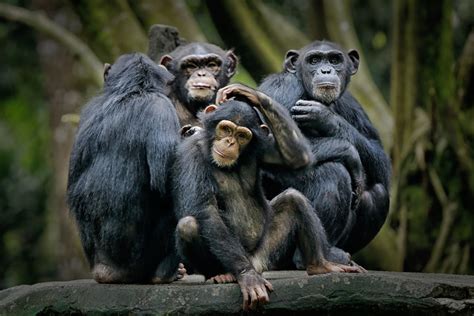Chimpanzees, our closest primate relatives, are known for their complex social behaviors. From grooming each other to forming alliances, these creatures exhibit various ways of building and maintaining relationships within their groups. But could something as mundane as urination also play a role in chimpanzee social dynamics? Meet Ena Onishi, a dedicated doctoral student at Kyoto University who has spent countless hours observing the urinary habits of these fascinating animals.
It all started at the Kumamoto Sanctuary in Japan, where Ms. Onishi noticed a peculiar pattern among a group of captive chimpanzees – they seemed to synchronize their bathroom breaks. This observation led her to delve deeper into what she calls
“contagious urination,”
a behavior where one chimp’s need to go triggers a chain reaction among others nearby. Reminiscent of contagious yawning in humans, this phenomenon intrigued Ms. Onishi and her research team.
As Ms. Onishi meticulously documented over 1,300 instances of chimps urinating in unison, a compelling picture emerged. The closer a chimp was to the initial urinator, the more likely it was to join in. Interestingly, individuals lower in the social hierarchy were more inclined to participate when others did so—a finding that shed light on potential links between status and behavioral synchronization.
“This result was surprising for us,”
Ms. Onishi remarked.
“It raised intriguing questions about the social function of this behavior.”
While the exact purpose behind this communal act remains shrouded in mystery, researchers speculate on its implications for group cohesion and coordinated activities among chimpanzee communities.
But is contagious urination unique to captive chimps at sanctuaries like Kumamoto? Not quite, says Dr. Martin Surbeck from Harvard University, an expert on primate behavior ecology. Drawing parallels with how wild apes coordinate their actions within groups, Dr. Surbeck suggests that such behaviors might transcend captive settings and extend into natural habitats.
Indeed, as Ms. Onishi reflects on her findings, she emphasizes the value of simple yet insightful observations in unraveling the mysteries of animal behavior:
“There is a myriad of things to be discovered from the daily activities of animals.”
In essence, every peeing session among chimps might hold clues about their intricate social world waiting to be deciphered by curious minds like hers.
So next time you witness your furry friends heading off together for a bathroom break at the local zoo or sanctuary—remember—it might not just be about relieving themselves but could very well be an expression of solidarity and kinship among our enigmatic cousins swinging through the treetops.




Leave feedback about this